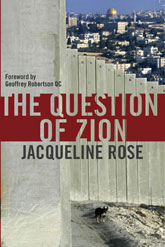 In this book Jacqueline Rose puts the nation of Israel on the psychoanalytical couch – literally. I saw Ms Rose on the ABC’s Lateline program and found her an interesting and eloquent speaker. The idea of treating the problem of Israel in this way – she comes from a literary and psychoanalytical background – seemed pretty interesting.
In this book Jacqueline Rose puts the nation of Israel on the psychoanalytical couch – literally. I saw Ms Rose on the ABC’s Lateline program and found her an interesting and eloquent speaker. The idea of treating the problem of Israel in this way – she comes from a literary and psychoanalytical background – seemed pretty interesting.The book goes into a lot of the thought of the early Zionists. To be honest, I found the book hard to concentrate on. If you’re not familiar with a lot of the early Zionist writers that she discusses, and I’m not, you may find the book a bit obscure, as I did. Disappointingly, Rose’s writing style doesn’t help much either. There were too many dashes and colons and sentences overloaded with quotations from differing writers.
Yet I must admit to having failed to read the book with due attention. Perhaps a second reading would have made her thesis clearer to me.
From what I could follow, she seemed to be saying that Zionism had a flawed internal logic. The nation of Israel had been created in an entirely unusual and unprecedented way: as a moral imperative. The holocaust made necessary the state of Israel. The world agreed that the Jews had suffered terribly, and that they needed their own state so that they could protect themselves. Mix in with this a belief in a religious pre-destination, and you have some serious problems. (One of the chapter’s titles is Zionism as Messianism.)
Jacqueline Rose, as I understand it, is saying that Israel needs to step back from this view of itself as a nation pre-destined by God, otherwise it will only destroy itself. Instead it needs to look at the urgent human rights issues that have been created by the dispossesion of so many Palestinians. It needs to start behaving like any regular secular democracy.
I wish I had done a better job of reading this book, but frankly, with so many references to ‘theorists’ like Lacan, and occasional post modern jargon, I became frequently irritated with the language employed.
If you’re interested in this subject, I’d recommend giving the book a whirl. It’s only 155 pages, and has a good introduction by Geoffrey Robertson.
No comments:
Post a Comment